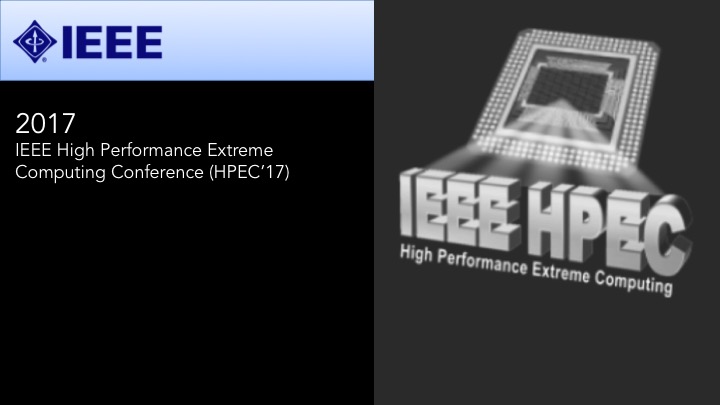
Since its beginnings in1998, HPEC (the High Performance Extreme Computing Conference) has grown to become an annual fixture of the September High Performance Computing (HPC) calendar. Now the largest computing conference in New England and the premier conference in the world on the convergence of high performance and embedded computing, HPEC was originally hosted at Lincoln Laboratory, but since its 2012 incorporation as an official IEEE conference, HPEC has made its home at the Westin Hotel in Waltham, MA.
Organized by Lincoln Laboratories, and with sponsorship this year from Seagate Government Solutions, Hewlett Packard, Intel Corp., DELL EMC, and MITRE Corp., HPEC ‘17, held September 12th to 14th, 2017 drew together over 90 presenters and close to 300 attendees.
Keynote speakers at the 2017 conference were Ivan Sutherland and Andreas Olofsson. Sutherland, who is regarded as the “father of computer graphics” spoke about “Clock Computing” while Olofsson, a program manager at DARPA’s Microsystems Technology Office (MTO), spoke about addressed “Intelligent Design Automation, System Optimization, and Open Hardware.”
Other invited speakers included Trung Tran (DARPA MTO), Barry Shoop (IEEE), Saman Amarasinghe (CSAIL MIT), David Bader (Georgia Tech.), Tim Braje (Lincoln Labs), Shekhar Borkar (formerly of Intel), Tim Davis (Texas A&M), John Feo (Northwest Institute for Advanced Computing), Josh Fryman (Intel), John Goodhue (MGHPCC), Jeremy Kepner (Lincoln Labs), Mark Ritter (IBM), Michael Vai (Lincoln Labs), and Masako Yamada (GE).
The technical program included tutorials from industry and academic experts, demonstrations, poster sessions, and special events such as the DARPA/Amazon/IEEE Graph Challenge (a competition to encourage community approaches to developing new solutions for analyzing graphs derived from social media, sensor feeds, and scientific as they evolve in real time). Topics addressed at this year’s conference included High Performance Data Analysis, Machine Learning, Advanced Multi-core Software Technologies, Case Studies and Benchmarking of Applications, Automated Design Tools, Mapping and Scheduling of Parallel and Real-Time Applications, Computing Technologies for Challenging Form Factors, ASIC and FPGA Advances, Open System Architectures, Data Intensive Computing, Big Data and Distributed Computing, Interactive and Real-Time Supercomputing, Graph Analytics and Network Science, and Fault-Tolerant Computing, Embedded Cloud Computing.
The 2018 IEEE High Performance Extreme Computing Conference, will take place from the 25th to the 27th of September 2018 in Waltham, MA. The submission deadline for papers is May 18, 2018, and for the GraphChallenge, July 8, 2018. For more information visit http://www.ieee-hpec.org/index.htm